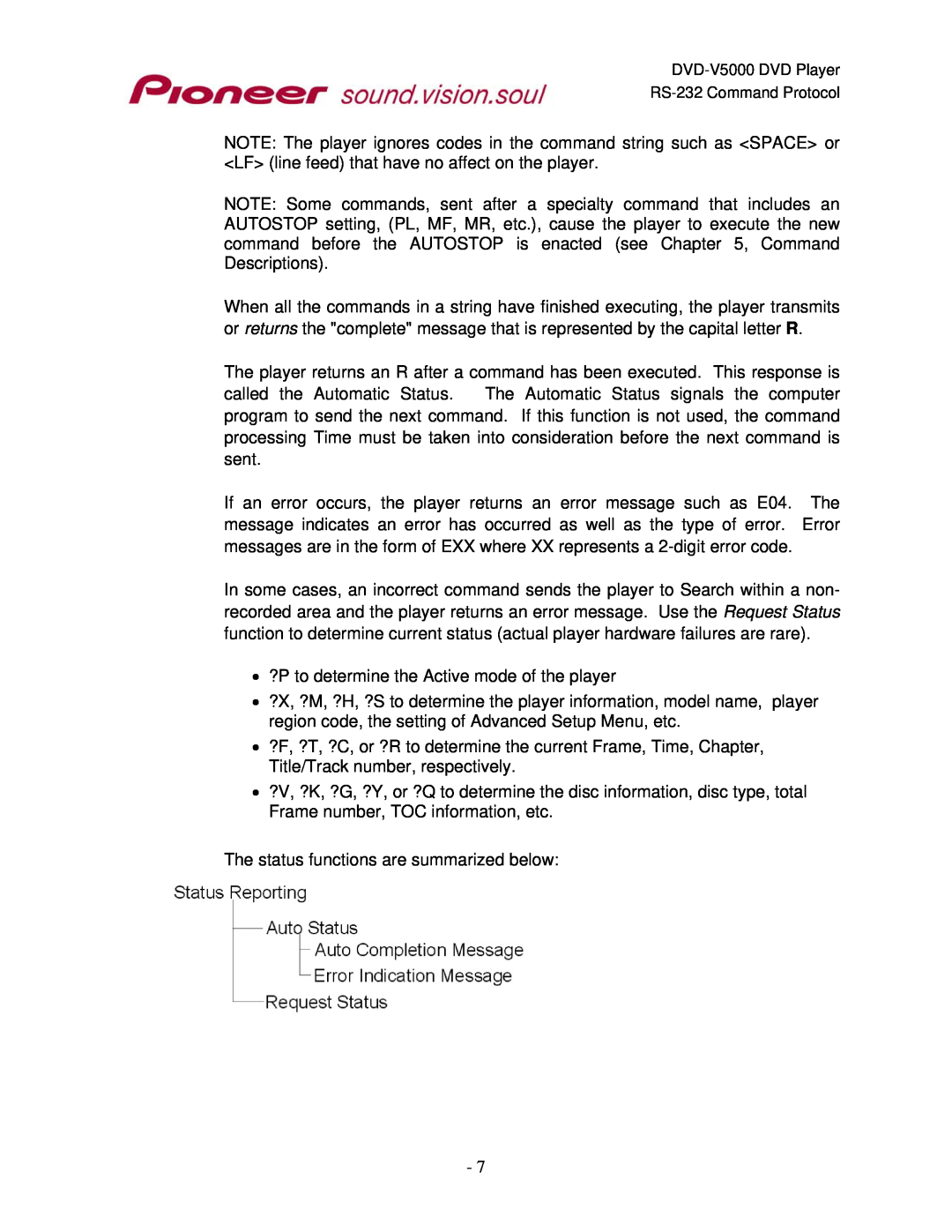Pioneer Corporation Pioneer Electronics USA Inc
Business Solutions Division
Manual Version June 30
DVD-V5000
Document No. V5000RS232CPM-100
Information in this document is subject to change without notice
Copyright c 2004-2005 Pioneer Electronics USA Inc
Printed in the United States of America
FCC INFORMATION
verify the cables and connectors between components are shielded
SAFETY CAUTION
increase separation between the player and components
5. COMMAND DESCRIPTIONS
Table of Contents
4. COMMAND STRUCTURE
INTRODUCTION
6. CURRENT PLAYER CONDITION REQUEST Descriptions
OPERATING MODES
DVD-V5000 INTERNAL REGISTERS
EXTEND TERMINAL CONTROL
Description
1. INTRODUCTION
Chapter Number
Pin #
2. INTERFACE 2.1 Interface Connector
2.2 Serial Interface Pin Specification
Terminal
2.3 Computer Control Functions
Input/Output
more than 100 msec
Power ON mode
Power OFF
3.1.1 Signal Interface
3. SERIAL CONTROL 3.1 Serial Interface Specifications
3.2 Communication with a Computer
3.1.2 Data Type
3.3 Command and Status
?P to determine the Active mode of the player
Register/Switch
3.4 Error Messages
3.5 Initial Setting
Setting at Power ON
Name
4. COMMAND STRUCTURE
COMMAND
Mnemonic
Name
4.2 Argument
4.1 Command Mnemonic
4.3 Command String
4.6 Request Status Return
4.5 Error Message
4.4 Status Returns
4.7 Timing
RxD P TxD
Execution
5.3 Reject
5. COMMAND DESCRIPTIONS 5.1 Open
5.2 Close
Door Opens Tray Ejects
Start
Error - No disc in tray
5.3.1 Reject
5.5 Play
plays to 3 minutes
5.6 Pause
5.7 Still DVD, VCD
seconds
Moves
5.8 Step Forward or Reverse DVD
5.9 Scan Forward, Reverse, or Stop
Frame forward
5.10 Multi-Speed Forward or Reverse DVD
5.11 Speed DVD, VCD
plays to 3 min. 25 secs
5.12 Search
Search to specified address
4500
5.13 Search & Play
Search to Frame
Address Mode set = Frame
5.14 Stop Marker
⇒ Still mode
5.15 Lead-Out Symbol
plays to 3 minutes 25 seconds
Continue playing to lead-out and
5.16 Clear
Time code in program end area
then return RCR
5.19 Time excludes discs without Time Codes
5.17 Frame DVD
5.18 Block Number CD
searches to Frame
Search to 123 min
5.20 Chapter DVD
5.21 Title DVD
secs
5.25 Select Subtitle DVD
5.23 Index CD
5.24 TRACK CD, VCD
IX1204SECR Search to Index 4, Track
5.28 Select Angle DVD
5.26 Select Audio DVD
5.27 Select Aspect DVD
5.29 Select Parental-Level DVD
5.30 Audio Control DVD, CD, VCD
5.31 Video Control
Register A
5.32 Display Control
Display condition is set on
5.33 Key Lock
The key lock switches ON / OFF
Execute Barcode/Command Stack
5.35 Barcode /Command Stack Play DVD
5.34 Stack Group Set DVD
bytes
5.36 Stack Data Upload
Numbers of
1 Fixed data
Example Segment Play Command Title 02, from Frame 3600 to Frame 4800
5.37 Stack Data Download
6.2 Title/Track Number Request
6. CURRENT PLAYER CONDITION REQUEST DESCRIPTIONS
6.1 P-Block Number Request
Track 12, Index 1, 3 minutes
Player plays Track
6.3 Chapter Number Request DVD
6.4 Time Code Request
Player plays Chapter
32 minutes, 13 secondsCD/VCD
6.5 Block Number Request CD
6.6 Frame Number Request DVD
117 minutes, 42 secondsDVD
6.9 TOC Information Request CD/VCD
6.7 Index Number Request CD
6.8 Total Frame Request DVD
Track 1, Index
first Track is 1, last Track is
6.10 Disc Region Code Request DVD
6.11 DVD Disc Status Request
lead-out Time is 66 min, 55 sec
6.12 CD Disc Status Request
disable Time Search
Error - except DVD disc loaded
Disc is not mounted
Time
6.13 Register A Set
Track
The screen display positions are pictured below
Only Frame number is displayed
6.14 Register D Set
6.15 Print Character
Select Line
6.16 Clear Screen
Register A and Display control
Displays the characters like this
Baud rate is 9600bps
6.17 Advanced Setup
Title repeat mode
Tray lock on
6.19 Player Active Mode Request
CCR = 3 Default Communication Mode
6.18 Communication Control Set
to CCR = 2 Communication Mode-2
Series name P1570 and code
6.21 Advanced Setup Request
6.20 Player Model Name Request
6.24 Input Number Request
6.22 Player Region Code Request
6.23 CCR Mode Request
Region Code
Receives the Pause Key command -A39F
6.25 Error Code Request
7 entered from remote controller
6.26 Input Unit Request
6.29 Register D Request
6.27 Input Barcode Data Request
6.28 Register A Request
Receives a Play code about DVD disc
Requests information from
6.30 Menu Call DVD
Sets the Register D
Register D
6.31 Numeric Button DVD
6.32 Button Select DVD
6.33 Enter Button DVD
6.34 Get Information DVD
X1 X2 X3 Y1 Y2 Y3
Others
6.35 Memory Data Upload
Contents
6.36 Return Firmware Version
Returns current firmware version
7. OPERATING MODES
7.3 Setup
7.4 Random Access
7.1 Open
7.5 Reject
8. DVD-V5000 INTERNAL REGISTERS
8.6 Remote Control Use Address Flag
8.7 Remote Control Digit Buffer
8.1 Current Time/Frame
8.10 Serial Use Address Flag
8.8 Remote Control Data Register
8.9 Laser Barcode Buffer
8.11 Search Time/Frame
8.17 Video Control
8.15 Mark Title/Track Mark Chapter
8.16 Mark Index
8.18 Audio Control
REGISTER MODEL
9. EXTEND TERMINAL CONTROL
9.1 Function Assignment
Function
STACK GROUP9
STACK GROUP7
STACK GROUP8
STACK GROUP10
9.2 Function User Setting
RIGHT Button
ENTER button to change the function of switch 8 to MENU
DOWN Button to select MENU
For an initial setting, Standard and User are the same
9.3 Controller
9.2.2 Diode Matrix Circuit
10. ADDITIONAL NOTES
FORMATS
APPENDIX A - COMPLETE COMMAND LIST BY NAME
SUPPORTING
FORMATS
APPENDIX B - COMPLETE COMMAND LIST BY MNEMONIC
FORMATS
APPENDIX C - DVD COMMAND LIST
Name
APPENDIX D - CD COMMAND LIST
arg VD
APPENDIX E - VCD COMMAND LIST
Name
APPENDIX F - ERROR CODES
DVD-V5000
Industrial DVD Player RS-232 Command Protocol
Business Solutions Division 2265 East 220th Street
Pioneer Electronic Corporation
